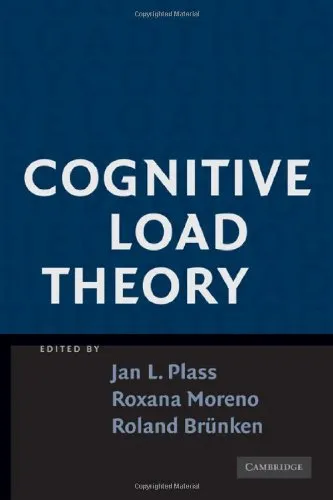Cognitive Load Theory
4.4
بر اساس نظر کاربران

شما میتونید سوالاتتون در باره کتاب رو از هوش مصنوعیش بعد از ورود بپرسید
هر دانلود یا پرسش از هوش مصنوعی 2 امتیاز لازم دارد، برای بدست آوردن امتیاز رایگان، به صفحه ی راهنمای امتیازات سر بزنید و یک سری کار ارزشمند انجام بدینمقدمهای بر کتاب 'Cognitive Load Theory'
کتاب 'Cognitive Load Theory' نوشته Plass Jan L., Moreno Roxana، و Brünken Roland، یکی از مهمترین کتابها در زمینه نظریه بار شناختی در یادگیری است. این کتاب با هدف فهم بهتر چگونگی فرآیند یادگیری و تأثیر بار شناختی بر آن نوشته شده است. نویسندگان با ارائه مدلها و مثالهای کاربردی، به بررسی روشهای کاهش بار شناختی در فرآیندهای یادگیری میپردازند.
خلاصه جامع کتاب
در این کتاب، نویسندگان به تعریف و توضیح نظریه بار شناختی میپردازند، که شامل بار شناختی ذاتی، بیرونی و رویدادی میباشد. از طریق بررسی مطالعات مختلف در زمینه روانشناسی آموزشی، آنها تلاش میکنند تا تعاریف و مدلهای پیچیدهای را برای فهم بهتر فرآیندهای ذهنی حین یادگیری ارائه دهند. به علاوه، نویسندگان به بررسی راهکارهای بهینهسازی طراحی آموزشی، از قبیل استفاده از فناوریهای جدید و طراحی محیطهای یادگیری، میپردازند.
نکات کلیدی
- بار شناختی: این نظریه بیانگر فشار ذهنی است که بر یادگیرنده وارد میشود و میتواند فرآیند یادگیری را تحت تأثیر قرار دهد.
- بهینهسازی یادگیری: بکارگیری تکنیکهایی که هدف آنها کاهش بار شناختی و بهبود فرآیند یادگیری است.
- استفاده از فناوری: تأکید بر نقش فناوری در بهبود کیفیت آموزش و یادگیری
جملات معروف از کتاب
"همانطور که بار شناختی افزایش مییابد، توانایی پردازش اطلاعات کاهش مییابد."
"یک محیط یادگیری مؤثر توازنی بین پیچیدگی موضوع و تواناییهای یادگیرنده برقرار میکند."
چرا این کتاب اهمیت دارد
تفکر نوآورانه و علمی این کتاب راه را برای تحقیق و توسعه در زمینههای روانشناسی آموزشی و طراحی آموزشی باز کرده است. فهم و بهکارگیری اصول نظریه بار شناختی میتواند به طراحی بهتر برنامههای آموزشی و ایجاد محیطهای یادگیری مؤثر کمک کند، که این خود به بهبود یادگیری و عملکرد تحصیلی دانشآموزان و دانشجویان منجر میشود. این کتاب در دانشگاهها و مراکز تحقیقاتی به عنوان منبعی ارزشمند برای پژوهشگران و متخصصان آموزش شناخته میشود و سهم بزرگی در ارتقاء کیفیت یادگیری دارد.
Introduction to Cognitive Load Theory
Welcome to an in-depth exploration of Cognitive Load Theory, a groundbreaking work by Plass Jan L., Moreno Roxana, and Brünken Roland. This book dives into the intricacies of cognitive processes and how they affect learning and performance. As an essential resource for educators, instructional designers, and psychologists, this text provides a comprehensive guide to understanding and applying cognitive load theory in diverse educational settings. This introduction will provide a summary of the book, key takeaways, famous quotes, and an examination of why this book is vital for today's educational landscape.
Detailed Summary of the Book
In Cognitive Load Theory, the authors address how the human brain processes information and the implications of these processes for education and learning design. Central to the book is the concept that our cognitive capacity is limited and that learning environments must be designed to optimize this precious resource, thereby enhancing learning effectiveness.
The book begins by exploring the architecture of working memory, the centerpiece of cognitive load theory. It discusses how working memory capacity is limited and can easily become overloaded, leading to decreased learning efficacy. The authors meticulously explain different types of cognitive load: intrinsic, extraneous, and germane. Each type of load has distinct implications for instructional design.
A significant portion of the book is dedicated to strategies for managing cognitive load. This includes techniques for reducing extraneous load, which is often a result of poor instructional design, and optimizing intrinsic load, which is related to the inherent difficulty of the material itself. The authors provide practical suggestions and examples across different domains of knowledge and educational contexts.
The latter sections explore advanced applications and the latest research developments in cognitive load theory, offering insights into complex cognitive tasks and the role of technology in learning. Throughout, the authors underscore the importance of adapting educational methods to individual learners' needs, enhancing the adaptive learning experience.
Key Takeaways
- Cognitive load theory is crucial for understanding how individuals learn and the limitations of working memory.
- Designing effective instructional materials requires reducing unnecessary cognitive load, fostering deeper, germane processing.
- Adapting teaching methods to manage cognitive load can significantly enhance learning outcomes.
- The integration of technology into learning environments can be optimized by applying cognitive load principles.
Famous Quotes from the Book
"Understanding the constraints of working memory is crucial for the development of effective educational practices."
"The true art of teaching is knowing what not to do to avoid unnecessary mental effort for learners."
Why This Book Matters
Cognitive Load Theory is a must-read for anyone involved in education and instructional design because it offers a scientifically grounded view of how learning happens. In an era where knowledge delivery is increasingly complex and diverse, understanding and managing cognitive load paves the way for more effective educational practices. Moreover, by harnessing the principles outlined in this book, educators can enhance learner engagement, foster better retention of information, and ultimately, contribute to more successful learning outcomes.
The importance of this book extends beyond academic circles. With the rise of digital media and technology in education, the insights provided by cognitive load theory are crucial in informing the development of digital learning materials and platforms. Developers, educators, and training specialists alike will find the strategies for reducing extraneous load and enhancing germane load invaluable in creating intuitive, engaging learning experiences that cater to the complex needs of modern learners.
دانلود رایگان مستقیم
برای دانلود رایگان این کتاب و هزاران کتاب دیگه همین حالا عضو بشین
برای خواندن این کتاب باید نرم افزار PDF Reader را دانلود کنید Foxit Reader


